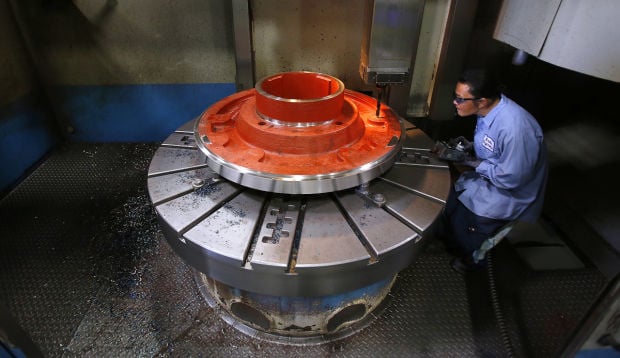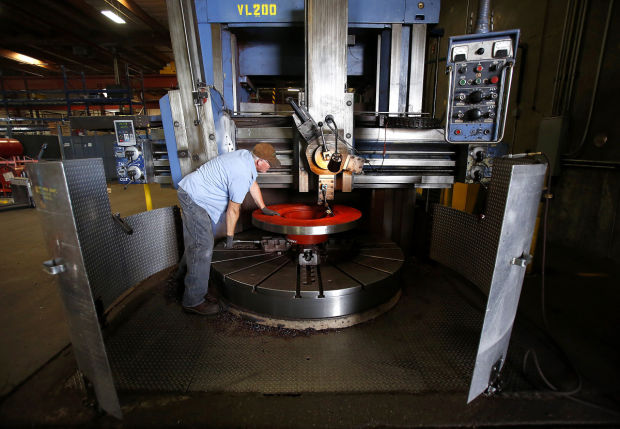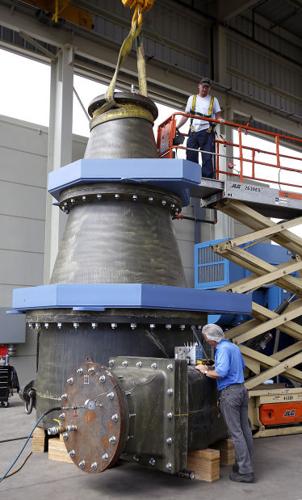A growing phalanx of companies in Tucson and Southern Arizona service the mining industry.
Amigos, a statewide industry support group, counts its Southern Arizona membership at about 250 to 300 businesses. They employ a total of 25,000 to 30,000 people, says Bob Humphrey, an Amigos board member. The business count has grown from about 150 in 2003, due mainly to the rise in global copper prices from about $1.30 per pound back then to a little over $3 today.
The companies include engineering firms, environmental consultants, industrial distributors, equipment manufacturers, metal fabricators, dealers of Caterpillar construction equipment, systems suppliers, temporary employee firms, construction service firms, structural concrete and steel suppliers, construction services firms, mine planning and evaluation firms and many more.
While individual companies cite many reasons for locating here, chief among them is the large copper mine presence in the region, including Freeport McMoRan Copper & Gold’s Sierrita Mine and Asarco’s Mission Mine south of Tucson; mines elsewhere in Arizona and in southern New Mexico; and a smelter in Hayden.
But that growth hasn’t always been smooth. Copper prices, which topped $4 a pound in 2011, have slid slowly since then due to the still-uneasy U.S. economy and instability in the Chinese market, which buys about 40 percent of the world’s supply. The price was in the very low $3 range in mid-April.
Here are the stories of four local support businesses:
- For the past 10 years, business has been stable or increasing for Humphrey, owner of J.R. Kennedy and Co. in Tucson, at 3540 E. Golf Links Road, which sells drill bits and other equipment for the mining industry. Having owned the business since 1979, he has kept his workforce down recently, at four employees compared with six to 10 through most of the last decade, but that’s because Humphrey, at 70, is edging toward retirement and gradually easing back on his workload.
- FLSmidth Krebs, which makes slurry pumps and cyclone-shaped devices that separate large from small solid materials in mineral ore, is riding a wave of growth at its northwest-side plant, at 5505 W. Gillette Road, near the Cortaro Road-Interstate 10 interchange. Headquartered in Copenhagen, the company has doubled its Tucson workforce to 300 since 2008 despite the intervening economic bust.
The Tucson subsidiary can’t disclose its exact revenue, which Pat Turner, the subsidiary’s president, says is above $100 million annually.
“Our business has more than tripled in revenue since 2003, although the last couple of years our business has softened,” Turner said. “We’re still doing OK. We’re making a profit.”
What’s different now from previous up-and-down cycles in the copper industry is that China is such a huge player, he added.
“With 40 percent of total worldwide demand from China, if they go up 20 percent, that’s an 8 percent increase in (global) demand,” Turner said. “If they go down 20 precent, that’s an 8 percent decrease in demand. Copper is priced at the margins, so a small increase or decrease in demand is a big difference in the price.”
- Corey Delta Inc., a general contracting firm operating here for four years that has built mines in Arizona, Nevada and California, is going out of business, said
- Gene Waken
- , its president and CEO. The company was founded in California in 1974. Although Waken has sold the company to another firm that will do some of the same work, he has recently shut down a Tucson office that had operated in midtown on East Broadway.
- Atlas Copco, a Swedish-owned company that sells drilling equipment, opened stores in Tucson and Phoenix eight years ago. The company’s big focus in Arizona is selling large, blast-hole drill equipment for open pit copper mines, said
- Ed Greer
- , manager of its south-side store at 6393 S. Campbell Ave. It probably does business with all mines in the area and every major construction company in the state, he said.
Right now, however, business is a bit on the downside, although it’s improved since the 2007-09 bust and ensuing recession. Its Arizona workforce has dropped from 45 before the recession to 33 today in its Tucson and Phoenix stores, Greer said. But that number is still better than right after the recession hit, when the company laid off half its staff.
“Things aren’t too far down, but down enough to keep everyone worried. Look at base metal prices and see where they are at. That affects us,” Greer said. “When metal prices are down, all companies are looking to see how to cut costs. The big mines aren’t going out and spending money like they did before, either.”
Tucson companies that support the mining industry are on the same page on one point: They want the proposed Rosemont Mine approved, built and mining copper.
Rosemont’s potential recently inspired a Tucson commercial real estate broker, Michael Coretz, to write a report seeking to interest potential tenants and corporate clients in the mining industry worldwide into relocating here.
“The mine will create more jobs here for university graduates if they stay in town and bring families to town to buy homes,” said Coretz, a principal of ITRA Global/Commercial Real Estate Group. “The companies may be based in Dallas, Colorado Springs or Montana, but in order to serve the mine they’ll have to have some presence here locally. Whether it’s a tire supplier, a parts supplier or dust suppression equipment, they can’t send away for it to have it show up a week or 10 days later.”
If approved, Rosemont would change the support industries’ employment picture drastically, agreed Mark Sutton, president and CEO of Meridian Engineering in Tucson.
A Rosemont opponent questions the need, however, saying copper prices are stagnant and global demand is down. “Some of the businesses are competing with each other and it’s not like they will all get rich because of Rosemont,” said Randy Serraglio, a conservation advocate for the Center for Biological Diversity.






